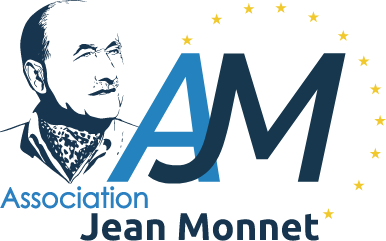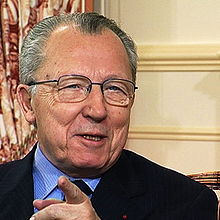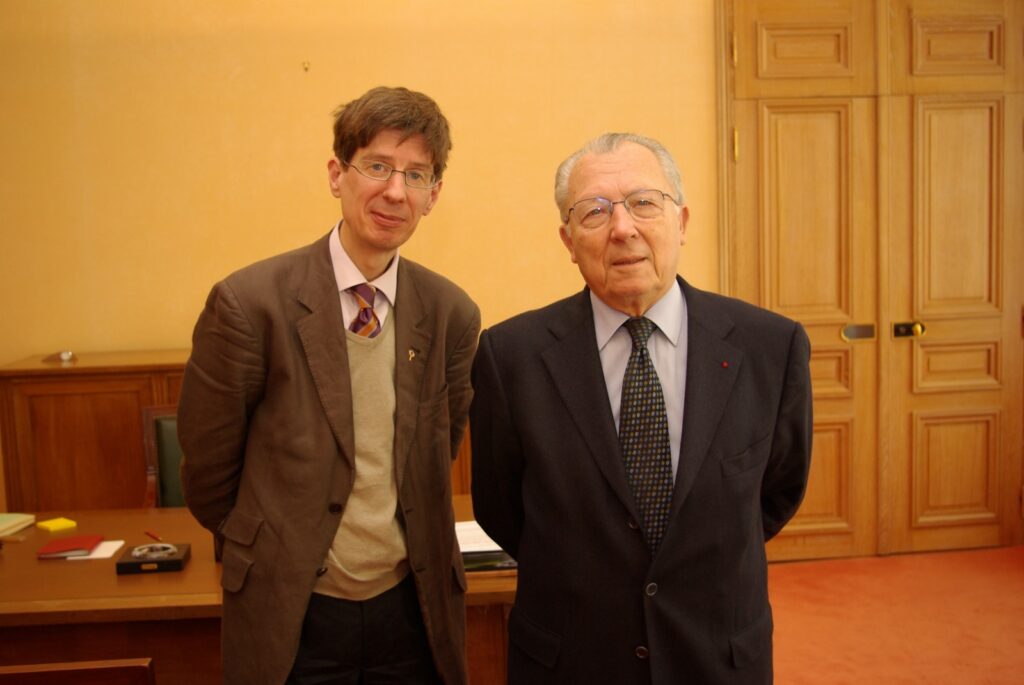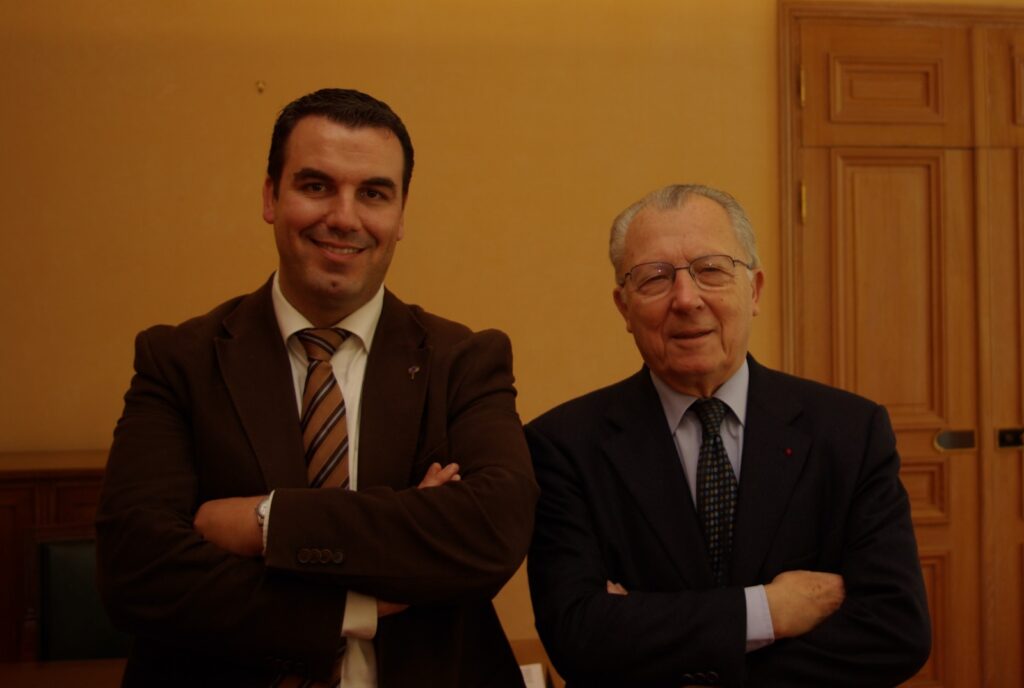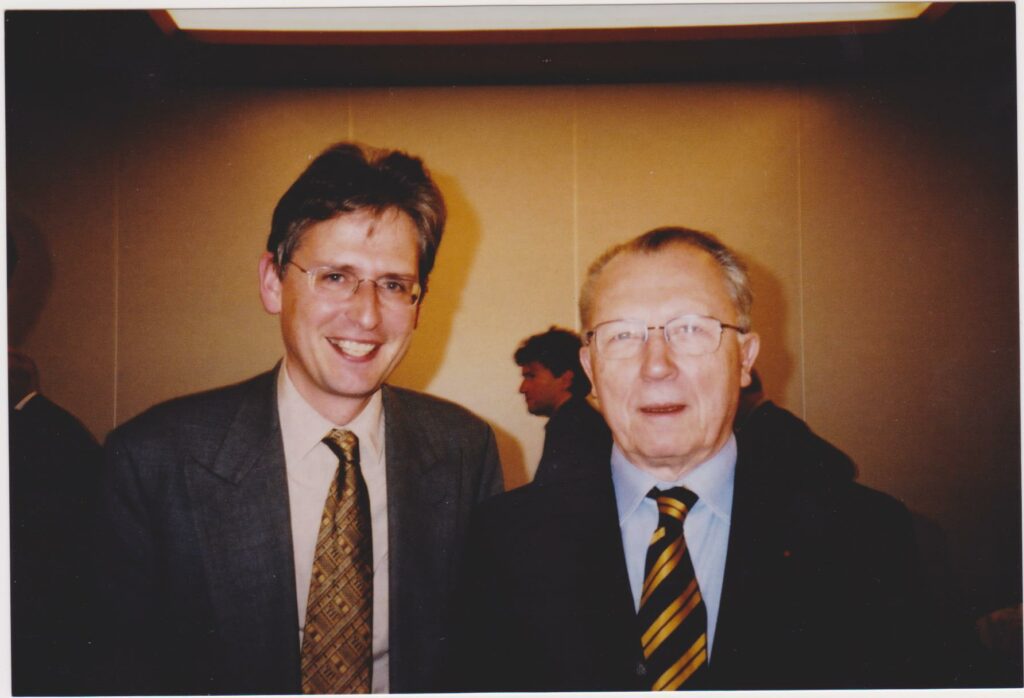by AJM members
27 March 2024
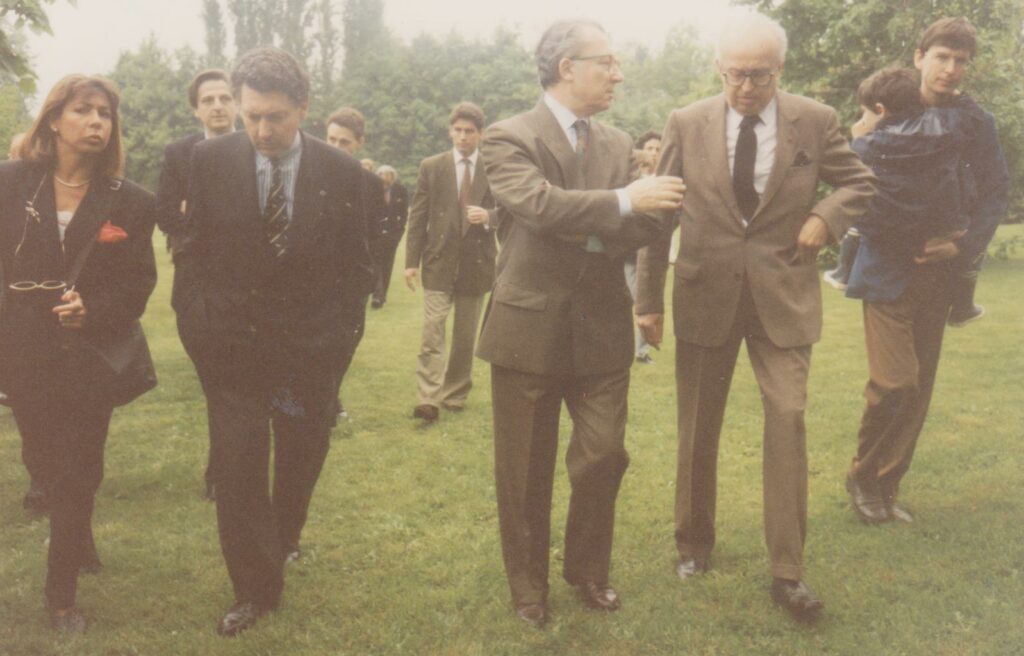
par Bruno Vever
Tribute
Jacques Delors summed up his entire European approach in a single phrase: "competition that stimulates, cooperation that strengthens, solidarity that unites".
Three memories come back to me of this perfect coherence at the heart of his actions.
Competition that stimulates
In 1981, when François Mitterrand attempted an economic policy that went against the grain of all our European partners, I had been a young permanent delegate of the CNPF for two years, representing our companies in Brussels, which had been neglected until then and had overnight become the last bastion of our freedoms. The nationalisation of major companies and banks went hand in hand with the imposition of oppressive exchange controls. Faced with the inevitable deterioration in foreign trade, the government attempted to "reconquer the internal market" in opposition to the common market and the EMS. Its illusory sirens disturbed and fractured the unity of our members.
Faced with these internal divisions, I decided, despite the pressure and the risks, to play the European card to the hilt and support the Commission in all its counter-fires. This made me an objective ally of Jacques Delors, a realist who was himself trying, as Finance Minister, to limit the excesses and damage. At the end of two perilous years, François-Xavier Ortoli, Vice-President of the Commission, told me that our resistance had paid off: "I saw Delors yesterday, France is coming to its senses and we are going to help the prodigal son return". To this end, Delors had put his resignation on the line, convinced that no progress is sustainable without competition.
Cooperation that strengthens
When Jacques Delors became President-designate of the European Commission in 1984, he escaped from his Clichy town hall to make more contacts. Within UNICE, the predecessor of BusinessEurope, we supported him in his efforts to turn the competition he had experienced as a minister into the driving force behind an unfettered European internal market, the guarantee of a one-way recovery. With our priorities in line with his own, he launched his single market programme in 1992, the prelude to Maastricht and the euro.
The United Kingdom tried (already!) to oppose it by threatening to boycott the conference, which was a prelude to the Single Act and the abandonment of unanimity that it feared. But the British CBI, whose fax machine I shared in Brussels, managed to change Margaret Thatcher's mind, which was quite a feat! As for our members, even those who were compromised in 1981 in the fallacious reconquest of the internal market miraculously converted to the cycles of preparation for 1992, thereby helping to make my practical guide to the single market a bestseller which greatly enhanced my credibility, including in the banking sector! Thank you once again, Jacques Delors, and all the more so because this programme enabled me, for eight years, to go out every month and check on its progress in all the Member States, at the head of the Single Market Observatory of the European Economic and Social Committee!
Solidarity that unites
A former social adviser to Prime Minister Chaban-Delmas in 1969 and a member of the reformist trade unions, Jacques Delors had a social streak and did not want a single European market without it. But as a man of dialogue, he declared himself ready to give priority to the social partners before any intervention by the Council and the European Parliament. And just as the CBI had convinced Margaret Thatcher of the merits of the single market, we in turn had to convince the CBI of the merits of social dialogue. This was no mean feat! It fell to François Perigot, President of UNICE after having been President of the CNPF, to succeed, at the end of a rollercoaster ride, by agreeing on a majority to open negotiations and unanimity to conclude them, at this stage difficult to block alone against the others.
Zygmunt Tyszkiewicz, Secretary General of UNICE, a great European like François Perigot, both of whom sadly passed away recently, had the task of leading the UNICE delegation during these negotiations. He did so with openness, but also with firmness. I can still remember Jacques Delors reproaching me at the beginning, not without acrimony, for this firmness: "He's too close to perfidious Albion" he said to me. Tyszkiewicz was a Polish child who took refuge in England in 1939 at the age of five and was brought up in a purely British tradition, but he was nonetheless a true European. So I replied: "Better a difficult but reliable interlocutor than a double agent who will betray you". Jacques Delors, an outspoken Christian, jokingly concluded, "Dieu vous entende! His wish was granted, because this social dialogue gave birth to numerous European contractual agreements, confirmed in as many directives.
Faith that shakes things up
To conclude, a final account of what was the real secret of his success, which we urgently need to rediscover with the war back on Europe's doorstep: the faith that shakes things up! Accompanying François Perigot to Jacques Delors' home one day, we had to wait a good hour. Suddenly, to our surprise, the door opened to reveal Helmut Kohl, who had come to negotiate the "day after" the fall of the Berlin Wall. As he introduced us to the Chancellor, Jacques Delors added, clasping his hands together: "I hope that the fall of the walls will inspire, and therefore shake up, social dialogue! Having myself done a year's armed service facing the Berlin Wall, a fracture point in the antagonisms of a divided Europe, before moving to Brussels, a fracture point in the antagonisms between capitals, companies and social partners, I heard myself reply: "In Brüssel wie in Berlin, Ende gut, alles gut". And we all laughed heartily! So, for this best memory of my European life, and for having built so many bridges where until then I had known only walls: Thank you Jacques Delors!
par Henri Malosse
Tribute
Jacques Delors : A great European who knew how to listen and how to be benevolent
I have a very special and personal memory of Jacques Delors that I would like to share, because it seems to me that he demonstrated qualities that are becoming increasingly rare among today's great leaders: listening and benevolence.
Please excuse any lack of modesty you may detect in this anecdote. But, in reality, even if I am a humble protagonist, I believe that this story should be credited solely to the Man of the "social contract".
I had the good fortune to meet Jacques Delors for the first time in Paris in the autumn of 1984, when he had already been appointed President of the European Commission but had not yet taken up his post. At the time, I was the Permanent Representative to the European Institutions in Brussels of the Permanent Assembly of Chambers of Commerce and Industry (APCCI).[1]Its chairman was Alsatian Pierre Netter, who, when he was head of the Centre des Jeunes Dirigeants, had struck up a friendship with the then adviser to Prime Minister Jacques Chaban-Delmas.
Because of this relationship with Pierre Netter, based on esteem and respect, Jacques Delors came to our offices on the Avenue d'Iéna at our invitation, for a lunch which was attended by his future Cabinet Director, Pascal Lamy.
These meetings were repeated several times later in Brussels, at the Berlaymont. Every time President Netter came to visit our Delegation and meet European leaders, we were invited to the table of the President of the European Commission. I was lucky enough to meet Jacques Delors several times during his two terms at the head of the Executive. I also remember a long conversation about Poland and the Balkans, just as the Iron Curtain was coming down. Naturally, we bumped into each other afterwards.
But I have one particular memory of the Paris lunch. It was our Director General, Prefect Laurent Chazal, who led the table discussions. It so happened that, although Jacques Delors had been very familiar with the world of the European Union through his time in the European Parliament for almost two years, where he had very quickly grasped all the issues at stake, he had subsequently distanced himself from it somewhat with his ministerial duties. I was the only one at the table, despite my young age (just thirty), who had day-to-day experience of the mysteries of the European Union, which I had been working on for nearly six years. Jacques Delors took the time to ask me about my reasons for moving to Brussels, my expectations and my hopes. I immediately felt a benevolent, amused and even warm gaze, which encouraged me to open my heart to him and tell him about my passion for European integration.
At the time, Jacques Delors was under pressure from the British and the major industrialists to create the single market (which he did with the Single European Act and the "1992 objective"), but he felt that the future single market had to be counterbalanced by a policy of economic and social catch-up for regions whose development was lagging behind and in favour of the least-favoured groups.... As he said a little later " You can't fall in love with a big market ". I had no hesitation in stressing the importance of involving economic players, such as the CCIs, which are highly representative of the fabric of local SMEs, to support the economic catch-up of favoured areas, train young people through apprenticeships and vocational training, and also mentioned the value of organising student exchanges on a European scale to "make Europeans". I was outspoken in my criticism of the way in which the French state had appropriated the meagre European regional development funds in order to be reimbursed for the credits granted to improve the Breton or Auvergne road networks. In fact, until 1984, it was forbidden to mention the European origin of these funds, something that our Delegation of French Chambers of Commerce and Industry did not hesitate to do... To my great surprise, Jacques Delors, who had just left his post as Minister of the Economy and Finance, smilingly gave his blessing to our act of transparency.
I have no pretension of believing that our conversations in Paris had much influence on the implementation of the cohesion policy or the ERASMUS programme, but what impressed me most was the great humility of the man, the great consideration he had for the institution we represented, the Chambers of Commerce and Industry, his great respect for Pierre Netter and Laurent Chazal, but also the astonishing benevolence he showed me. He had come to listen, not to listen to himself speak, like so many politicians who invite courtiers to their table, hoping for admiration and expecting compliments.
Jacques Delors was awaited in Brussels with a great deal of suspicion because of his socialist commitment and his participation in François Mitterrand's first government, the government of nationalisations. He proved to be an outstanding President, possessing both the ability to engage in dialogue and to listen that is required of someone who must bring Europeans together, but also the firm determination never to give in when Europe's interests demanded it. For me, these are the qualities of a true Statesman possessed by this self-taught man from a modest family, a discreet but fervent Catholic, who will remain, I am sure, one of the great Frenchmen of Europe, on a par with Jean Monnet or Robert Schuman.
[1] APCCI: now CCI France
par Philippe Laurette
Tribute
I wanted to complement the excellent contributions by Henri Malosse and Bruno Vever.
I wasn't a close friend of Jacques Delors and wasn't part of his inner circle, but I had the pleasure of meeting and talking to him, for example at the Maison de Jean Monnet, at the convention of the European Movement in Lille and at the Jean Monnet Foundation in Lausanne. I also had the opportunity to listen to him many times. I also often saw members of his team in Paris, Brussels and Strasbourg.
I won't go back over his career as a great European, but I will try in a few sentences to explain why there is a nostalgia for Delors in the European institutions, in many capitals and in French public opinion.
Jacques Delors possessed many qualities considered too rare in France.
He was :
- in the service of a project: the construction of Europe, and not in the service of a personal career plan. His person was of little importance to him. He will not be a candidate for the presidency of the Republic despite favourable opinion.
- humble, honest, sincere and respected his commitments
- open to discussion and exchange, and the opposite of a sectarian
- conscientious and hard-working
- simple and determined
It wasn't for him:
- privileged interlocutors compared to others.
- large or small countries.
He didn't work alone.
He knew :
- surround himself with a diverse and efficient team of top-quality people, who, like Jean Monnet's colleagues, did not count their time
- be in permanent contact with a wide network in civil society: associations, social partners, intellectuals, Christian circles, ....
He was respected for all this and yes, we miss Jacques Delors.
